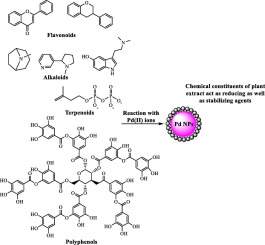当前位置:
X-MOL 学术
›
Adv. Colloid Interface Sci.
›
论文详情
Our official English website, www.x-mol.net, welcomes your feedback! (Note: you will need to create a separate account there.)
Pd-based nanoparticles: Plant-assisted biosynthesis, characterization, mechanism, stability, catalytic and antimicrobial activities.
Advances in Colloid and Interface Science ( IF 15.6 ) Pub Date : 2020-01-09 , DOI: 10.1016/j.cis.2020.102103 Mahmoud Nasrollahzadeh 1 , Mohaddeseh Sajjadi 2 , Jaber Dadashi 2 , Hossein Ghafuri 2
Advances in Colloid and Interface Science ( IF 15.6 ) Pub Date : 2020-01-09 , DOI: 10.1016/j.cis.2020.102103 Mahmoud Nasrollahzadeh 1 , Mohaddeseh Sajjadi 2 , Jaber Dadashi 2 , Hossein Ghafuri 2
Affiliation

|
Among various metal nanoparticles, palladium nanoparticles (Pd NPs) are one of the most important and fascinating nanomaterials. An important concern about the preparation of Pd NPs is the formation of toxic by-products, dangerous wastes and harmful pollutants. The best solution to exclude and/or minimize these toxic substances is plant mediated biosynthesis of Pd NPs. Biogenic Pd-based NPs from plant extracts have been identified as valuable nanocatalysts in various catalytic reactions because of their excellent activities and selectivity. They have captured the attention of researchers owing to their economical, sustainable, green and eco-friendly nature. This review attempts to cover the recent progresses in the fabrication, characterization and broad applications of biogenic Pd NPs in environmental and catalytic systems. In addition, the stability of biosynthesized Pd NPs and mechanism of their formation are investigated.
中文翻译:

钯基纳米颗粒:植物辅助的生物合成,表征,机理,稳定性,催化和抗菌活性。
在各种金属纳米粒子中,钯纳米粒子(Pd NPs)是最重要且引人入胜的纳米材料之一。制备Pd NP的一个重要问题是有毒副产物,危险废物和有害污染物的形成。排除和/或最小化这些有毒物质的最佳解决方案是植物介导的Pd NP的生物合成。来自植物提取物的生物型基于Pd的NP由于其出色的活性和选择性而被确定为各种催化反应中有价值的纳米催化剂。由于其经济,可持续,绿色和生态友好的性质,它们引起了研究人员的注意。这篇综述试图涵盖在环境和催化体系中生物钯纳米颗粒的制备,表征和广泛应用的最新进展。此外,
更新日期:2020-01-09
中文翻译:

钯基纳米颗粒:植物辅助的生物合成,表征,机理,稳定性,催化和抗菌活性。
在各种金属纳米粒子中,钯纳米粒子(Pd NPs)是最重要且引人入胜的纳米材料之一。制备Pd NP的一个重要问题是有毒副产物,危险废物和有害污染物的形成。排除和/或最小化这些有毒物质的最佳解决方案是植物介导的Pd NP的生物合成。来自植物提取物的生物型基于Pd的NP由于其出色的活性和选择性而被确定为各种催化反应中有价值的纳米催化剂。由于其经济,可持续,绿色和生态友好的性质,它们引起了研究人员的注意。这篇综述试图涵盖在环境和催化体系中生物钯纳米颗粒的制备,表征和广泛应用的最新进展。此外,


























 京公网安备 11010802027423号
京公网安备 11010802027423号